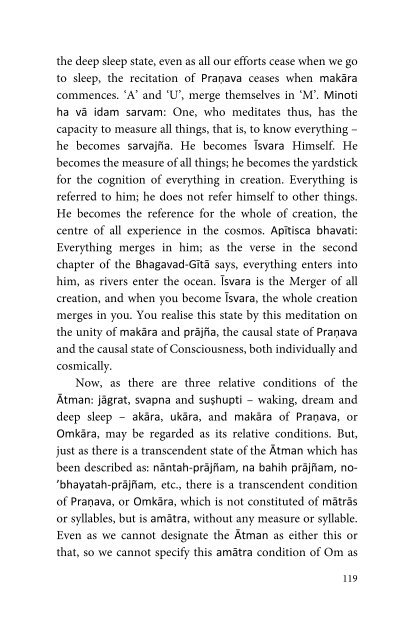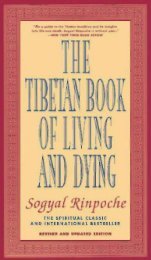Mandukya_Upanishad
Mandukya_Upanishad
Mandukya_Upanishad
You also want an ePaper? Increase the reach of your titles
YUMPU automatically turns print PDFs into web optimized ePapers that Google loves.
the deep sleep state, even as all our efforts cease when we goto sleep, the recitation of Praṇava ceases when makāracommences. ‘A’ and ‘U’, merge themselves in ‘M’. Minotiha vā idam sarvam: One, who meditates thus, has thecapacity to measure all things, that is, to know everything –he becomes sarvajña. He becomes Īsvara Himself. Hebecomes the measure of all things; he becomes the yardstickfor the cognition of everything in creation. Everything isreferred to him; he does not refer himself to other things.He becomes the reference for the whole of creation, thecentre of all experience in the cosmos. Apītisca bhavati:Everything merges in him; as the verse in the secondchapter of the Bhagavad-Gītā says, everything enters intohim, as rivers enter the ocean. Īsvara is the Merger of allcreation, and when you become Īsvara, the whole creationmerges in you. You realise this state by this meditation onthe unity of makāra and prājña, the causal state of Praṇavaand the causal state of Consciousness, both individually andcosmically.Now, as there are three relative conditions of theĀtman: jāgrat, svapna and suṣhupti – waking, dream anddeep sleep – akāra, ukāra, and makāra of Praṇava, orOmkāra, may be regarded as its relative conditions. But,just as there is a transcendent state of the Ātman which hasbeen described as: nāntah-prājñam, na bahih prājñam, no-’bhayatah-prājñam, etc., there is a transcendent conditionof Praṇava, or Omkāra, which is not constituted of mātrāsor syllables, but is amātra, without any measure or syllable.Even as we cannot designate the Ātman as either this orthat, so we cannot specify this amātra condition of Om as119



